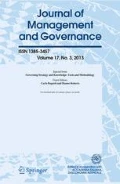Abstract
This paper studies the relationships among corporate governance (CG), ethical practices, and corporate social responsibility (CSR). In particular, the mediating effect of ethical practices on the relationship between CG and CSR is examined. Moreover, the moderating effects of financial performance, as well as board of directors characteristics on both the direct relationship between CG and CSR and the one mediated by ethical practices. Data were collected through a questionnaire distributed to employees working in private corporations operating in Lebanon and in various countries in the MENA region. The structural relationships among CG, ethical practices and CSR are analyzed using partial least squares structural equation modeling (PLS-SEM) in SmartPLS 3. The findings indicate that ethical practices fully mediate the relationship between the audit committee component of corporate governance and the three corporate social responsibility initiatives towards stakeholders, customers and employees. No such results were found for the corporate governance component of board of directors. Furthermore, multi-group analysis deployed to determine the moderating effects of performance and board of directors on these relationships identified differences in the relationships due to board characteristics and corporate performance.



Similar content being viewed by others
References
Agrawal, A., & Knoeber, C. R. (1996). Firm performance and mechanisms to control agency problems between managers and shareholders. Journal of Financial and Quantitative Analysis,31(3), 377–397.
Alas, R. (2006). Ethics in countries with different cultural dimensions. Journal of Business Ethics,69(3), 237–247.
André, K. (2013). The ethics of care as a determinant for stakeholder inclusion and CSR perception in business education. Society and Business Review,8(1), 32–44.
Argandona, A. (2011). Stakeholder theory and value creation (No. D/922). Barcelona: IESE Business School.
Barnea, A., & Rubin, A. (2010). Corporate social responsibility as a conflict between shareholders. Journal of Business Ethics,97(1), 71–86.
Blair, M. M. (1995). Ownership and control: Rethinking corporate governance for the twenty-first century. Washington, DC: Brookings Institute.
Cadbury, A. (1992). Report of the committee on the financial aspects of corporate governance. Gee, 1.
Callaghan, M., & Wood, G. (2014). The engagement with business ethics: An Australian journey 1995-2010. European Business Review,26(4), 286–304.
Carroll, A. (1991). The pyramid of corporate social responsibility: toward the moral management of organizational stakeholders. Business Horizons,34(4), 39–48.
Carroll, A. (1999). Corporate social responsibility. Business and Society,38(3), 268–295.
Chen, C. X., Lu, H., & Sougiannis, T. (2012). The agency problem, corporate governance, and the asymmetrical behavior of selling, general, and administrative costs. Contemporary Accounting Research,29(1), 252–282.
Claessens, S., & Yurtoglu, B. B. (2013). Corporate governance in emerging markets: A survey. Emerging Markets Review,15(1), 1–33.
Commission of the European Communities. (2002). Communication from the commission concerning corporate social responsibility: A business contribution to sustainable development. Brussels: Commission of the European Communities.
Dahlsrud, A. (2008). How corporate social responsibility is defined: An analysis of 37 definitions. Corporate Social Responsibility and Environmental Management,15(1), 1–13.
Dalton, D. R., Hitt, M. A., Certo, S. T., & Dalton, C. M. (2007). The fundamental agency problem and its mitigation. Academy of Management Annals,1(1), 1–64.
Demise, N. (2005). Business ethics and corporate governance in Japan. Business and Society,44(2), 211–217.
Denis, D. K., & McConnell, J. J. (2003). International corporate governance. Journal of Financial and Quantitative Analysis,38(1), 1–36.
Donaldson, T., & Preston, L. E. (1995). The stakeholder theory of the corporation: Concepts, evidence, and implications. Academy of Management Review,20(1), 65–91.
Ehikioya, B. I. (2009). Corporate governance structure and firm performance in developing economies: Evidence from Nigeria. Corporate Governance,9(3), 231–243.
ElGammal, W., El-Kassar, A. N., & Messarra, L. (2018). Corporate ethics, governance and social responsibility in MENA countries. Management Decision,56(1), 273–291.
El-Kassar, A. N., Elgammal, W., & Bayoud, M. M. (2014). Effect of internal audit function on corporate governance quality: Evidence from Lebanon. International Journal of Corporate Governance,5(1/2), 103–117.
El-Kassar, A. N., Messarra, L., & ElGammal, W. (2015). Effects of ethical practices on corporate governance in developing countries. Corporate Ownership & Control,12(3), 495–504.
Fornell, C., & Larcker, D. F. (1981). Evaluating structural equation models with unobservable variables and measurement error. Journal of Marketing Research, 18(1), 39–50.
Freeman, R. (1984). Strategic management: A stakeholder approach. Massachusetts: Pitman Publishing Inc.
Freeman, R. E. (2010). Strategic management: A stakeholder approach. Cambridge University Press.
Gaur, A. S., & Delios, A. (2015). International diversification of emerging market firms: The role of ownership structure and group affiliation. Management International Review,55, 235–253.
Gaur, A. S., & Kumar, M. (2018). A systematic approach to conducting review studies: An assessment of content analysis in 25 years of IB research. Journal of World Business,53(2), 280–289. https://doi.org/10.1016/j.jwb.2017.11.003.
Gaur, A. S., Ma, X., & Ding, Z. (2018). Perceived home country supportiveness/unfavorableness and outward foreign direct investment from China. Journal of International Business Studies. https://doi.org/10.1057/s41267-017-0136-2.
Gebba, T. R. (2015). Corporate governance mechanisms adopted by UAE national commercial banks. Journal of Applied Finance and Banking,5(5), 23–61.
Gompers, P., Ishii, J., & Metrick, A. (2003). Corporate governance and equity prices. The Quarterly Journal of Economics,118(1), 107–155.
Grant, G. H. (2003). The evolution of corporate governance and its impact on modern corporate America. Management Decision,41(9), 923–934.
Hill, R. P., Ainscough, T., Shank, T., & Manullang, D. (2007). Corporate social responsibility and socially responsible investing: A global perspective. Journal of Business Ethics,70(2), 165–174.
Jamali, D., Safieddine, A. M., & Rabbath, M. (2008). Corporate governance and corporate social responsibility synergies and interrelationships. Corporate Governance: An International Review,16(5), 443–459.
Jensen, M. C. (2002). Value maximization, stakeholder theory, and the corporate objective function. Business Ethics Quarterly,12(02), 235–256.
Jo, H., & Harjoto, M. A. (2012). The causal effect of corporate governance on corporate social responsibility. Journal of Business Ethics,106(1), 53–72.
Judge, W. Q., Gaur, A. S., & Muller, M. K. (2016). Antecedents of shareholder activism: Evidence from a multi-country study. Corporate Governance: An International Review,24(3), 258–273.
Lee, J.-H., & Gaur, A. S. (2013). Managing multi-business firms: A comparison between Korean Chaebols and diversified US firms. Journal of World Business,48(4), 443–454.
Lewicki, R. J., Barry, B., Saunders, D. M., & Minton, J. W. (2003). Negotiation. Boston: MacGraw-Hill International Editions.
Mitnick, B. (2013). Origin of the theory of agency: An account by one of the theory’s originators. https://ssrn.com/abstract=1020378; http://dx.doi.org/10.2139/ssrn.1020378.
Pae, J., & Choi, T. (2011). Corporate governance, commitment to business ethics, and firm valuation: Evidence from the Korean stock market. Journal of Business Ethics,100(2), 323–348.
Post, C., Rahman, N., & Rubow, E. (2011). Green governance: Boards of directors’ composition and environmental corporate social responsibility. Business and Society,50(1), 189–223.
Rahman, S. (2011). Evaluation of definitions: Ten dimensions of corporate social responsibility. World Review of Business Research,1(1), 166–176.
Reisberg, A. (2015). The UK Stewardship code: On a road to nowhere. The Journal of Corporate Law Studies,15, 217–253.
Rezaee, Z. (2009). Corporate governance and ethics. London: Wiley.
Rossouw, G. J. (2005). Business ethics and corporate governance in Africa. Business & Society, 44(1), 94–106.
Schilling, M. A. (2000). Decades ahead of her time: Advancing stakeholder theory through the ideas of Mary Parker Follett. Journal of Management History, 6(5), 224–242.
Singh, D., & Delios, A. (2017). Corporate governance, board networks and growth in domestic and international markets: Evidence from India. Journal of World Business, Elsevier,52(5), 615–627.
Singh, D. A., & Gaur, A. S. (2009). Business group affiliation, firm governance and firm performance: Evidence from China and India. Corporate Governance: An International Review,17(4), 411–425.
Singh, D., & Gaur, A. S. (2013). Governance Structure, innovation and internationalization: Evidence from India. Journal of International Management,19(3), 300–309.
Stern, R. N., & Barley, S. R. (1996). Organizations and social systems: Organization theory’s neglected mandate. Administrative Science Quarterly,41(1), 146–162.
Sweeney, L., & Coughlan, J. (2008). Do different industries report corporate social responsibility differently? An investigation through the lens of stakeholder theory. Journal of Marketing Communications,14(2), 113–124.
Timberlake, L. (2002). The business case for sustainable development: Making a difference toward the Earth Summit 2002 and beyond. WBSCD Executive Committee. Corporate Environment Strategy, 9(3).
Tuan, L. (2012). Corporate social responsibility, ethics, and corporate governance. Social Responsibility Journal,8(4), 547–560.
Turker, D. (2009). Measuring corporate social responsibility: A scale development study. Journal of Business Ethics,85(4), 411–427.
Votaw, D. (1972). Genius becomes rare: A comment on the doctrine of social responsibility Pt. I. California Management Review,15(2), 25–31.
Zeckhauser, R. J., & Pratt, J. W. (1985). Principals and agents: The structure of business. Boston: Harvard Business School.
Author information
Authors and Affiliations
Corresponding author
Rights and permissions
About this article
Cite this article
El Gammal, W., Yassine, N., Fakih, K. et al. The relationship between CSR and corporate governance moderated by performance and board of directors’ characteristics. J Manag Gov 24, 411–430 (2020). https://doi.org/10.1007/s10997-018-9417-9
Published:
Issue Date:
DOI: https://doi.org/10.1007/s10997-018-9417-9




